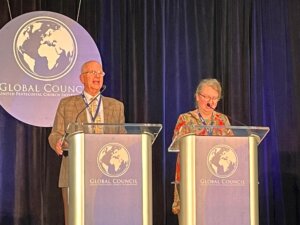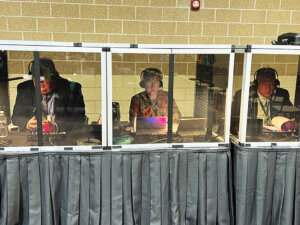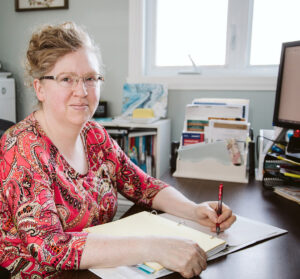 I mostly do written translation, but recently I had a very interesting (and terrifying!) experience of interpreting for a conference, the 2022 Global Council of the United Pentecostal Church International. Interpreting is so fast-paced that it’s easy to miss “false friends”: words that look and may sound similar in both languages, but have different meanings.
I mostly do written translation, but recently I had a very interesting (and terrifying!) experience of interpreting for a conference, the 2022 Global Council of the United Pentecostal Church International. Interpreting is so fast-paced that it’s easy to miss “false friends”: words that look and may sound similar in both languages, but have different meanings.
And that’s exactly what happened to me! One speaker stated that just as the conference opened, the population of the world had reached 8 billion. Well, there’s a French word billion, so I quickly used that, not wanting to fall behind. In the back of my mind, I realized something didn’t seem right. So once I got off the platform, I checked my dictionary and realized I had told everyone there were 8 TRILLION people in the world. In French, billion = trillion and milliard = billion.
That’s what happens when you don’t have enough time to check things. 🙂 I was joking about it later with some of the delegates from France. They were kind and laughed with me, saying, “Well, we knew what you meant.”
Maybe some of you have only done written translation, but are interested in interpreting as well. So I’d like to tell you more about my experience interpreting at the Global Council. There were 4 interpreters: Spanish, French, Malagasy and Portuguese. All of us were native English speakers who were available to interpret for non English-speaking delegates. These delegates were provided with headphones and could choose the channel of the language they needed.
 The four of us were seated in translation booths and wore headsets. We took turns interpreting from the platform, so the various speakers paused between each sentence, thankfully! (I wasn’t prepared to do simultaneous interpreting; this was stressful enough…)
The four of us were seated in translation booths and wore headsets. We took turns interpreting from the platform, so the various speakers paused between each sentence, thankfully! (I wasn’t prepared to do simultaneous interpreting; this was stressful enough…)
While there was soundproofing between the booths, it was really only effective if you leaned into the booth, and that was not sustainable for translating several hours each day. So in addition to hearing the speaker and platform interpreter through the headset, we could also hear the interpreters on either side of us. At first, this was disorienting, but I just had to learn to block out the sounds that weren’t relevant.
I didn’t realize how exhausting a non-physical activity could be! At the end of each session, I felt like I’d run a marathon. Having to think so fast was really draining… and I couldn’t afford to let my mind wander for even a second.
If you’re new to interpreting, here are some tips and insights from my experience that may be helpful.
- Make sure you have an extensive vocabulary in both languages, but if you can’t think of the exact word or expression to match what the speaker said, just use a synonym or explain it, so that you keep things moving. I had to do this when I blanked out on the French expression for the Day of Atonement… it came to me a few seconds later, and I was able to mention it then.
- Prepare as much as possible for the subject matter. I was so glad I had practiced memorizing the French names of the countries of the world, because I was on the platform for the opening session when over 200 delegates were introduced. I also did a written translation of the resolutions, and again I was on the platform for that section, so all I had to do was read the French version of the resolutions.
- Bring tools that will help you interpret. I had two iPads in front of me in the booth (one on the platform) – with documents I knew would be used, my list of country names in French, the resolutions, a bilingual dictionary, etc. I also had a binder with printed documents organized with dividers, so I could quickly open the one I needed.
- Turn slightly toward the speaker; as we discovered during the pandemic when we had to wear masks, a lot of our understanding comes from watching people’s lips move when they speak. So especially in this situation of having to listen at the same time as you formulate your translation, it really helps to see the speaker’s face. While I was in the translation booth, I could see the speaker on the screen.
- When you look out at the crowd, look at people who know you and will encourage you. This can really give you a boost.
- Have lots of water and quick snacks available; we had dark chocolate squares for when our energy started to wane.
I still prefer written translation, but it was definitely invigorating to push past my fears in order to participate in the Global Council. I am grateful for the privilege and for the encouragement and kind words of the delegates. I have to admit, though, that I found it really amusing when people who didn’t know French told me I did a good job! I wanted to say, “How do you know? I might have just been making up words.”
I guess what they meant is that when I was on the platform (which is the only time they could hear me), I kept my cool even though I was shaking inside. I talked quickly so there were no delays, even though I would have preferred more time to find the best way to say things. All in all, it was a great learning experience!
Have a great day!
Liane 🙂
www.LearnTranslation.com
www.NonprofitTranslation.org
